人教版(2019)必修第二册 Unit 3 The internet Reading for Writing 课件(共32张PPT)
文档属性
| 名称 | 人教版(2019)必修第二册 Unit 3 The internet Reading for Writing 课件(共32张PPT) |
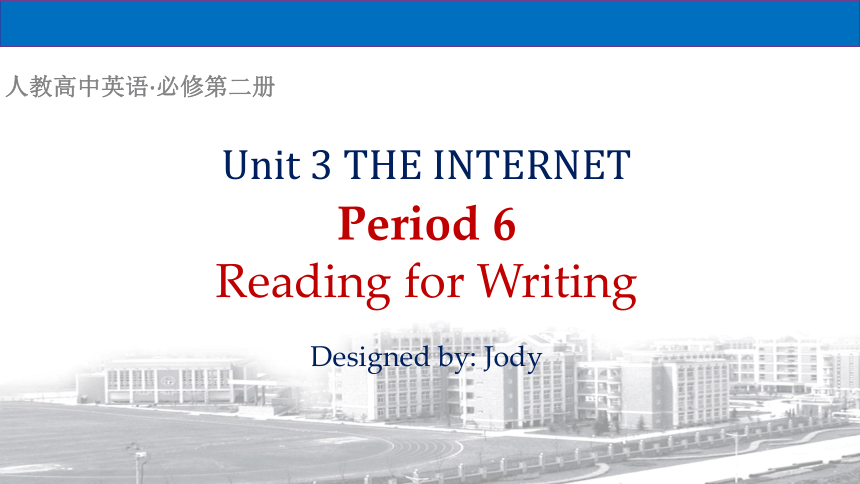
|
|
| 格式 | pptx | ||
| 文件大小 | 2.5MB | ||
| 资源类型 | 教案 | ||
| 版本资源 | 人教版(2019) | ||
| 科目 | 英语 | ||
| 更新时间 | 2024-09-19 12:59:52 | ||
图片预览

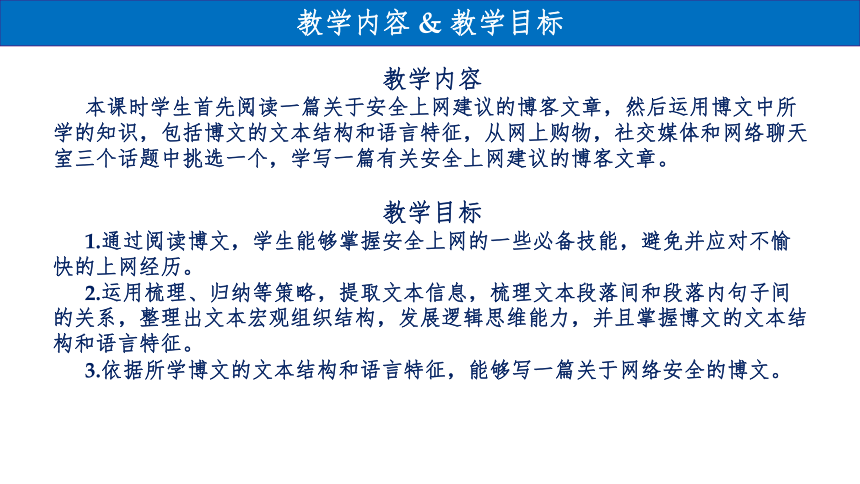
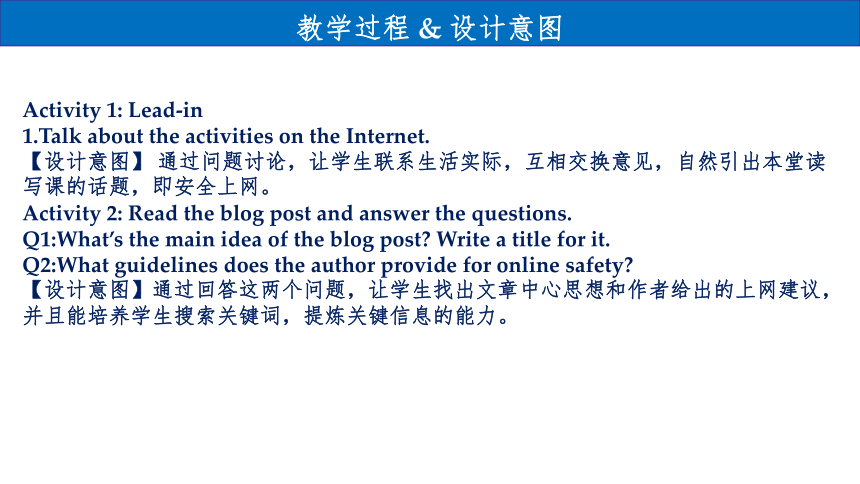
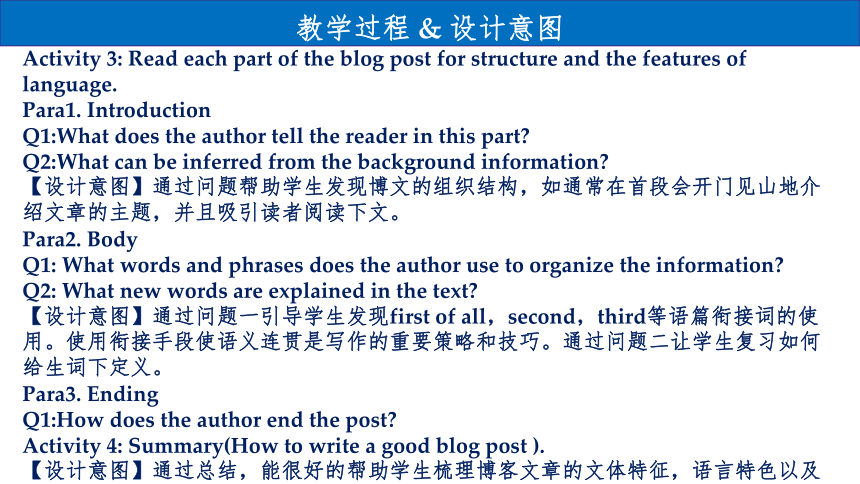
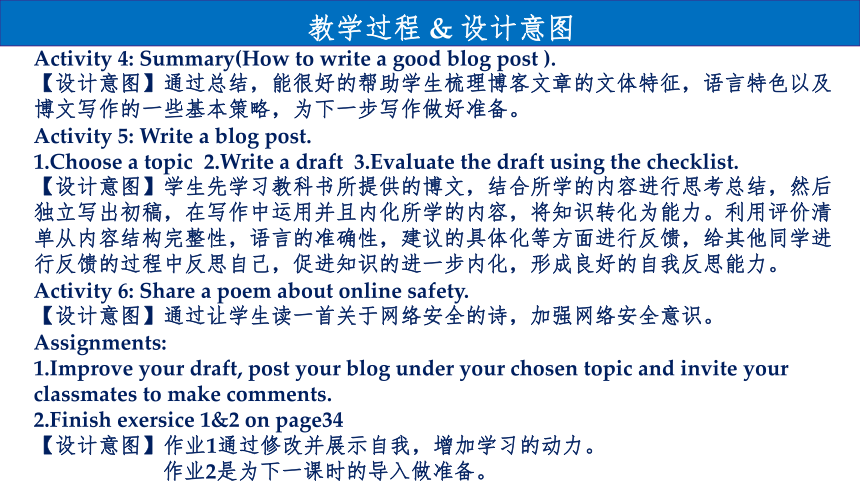

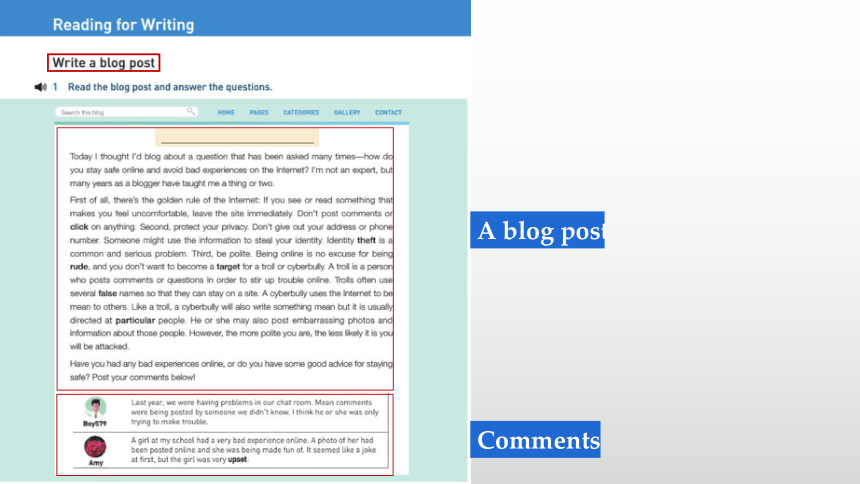
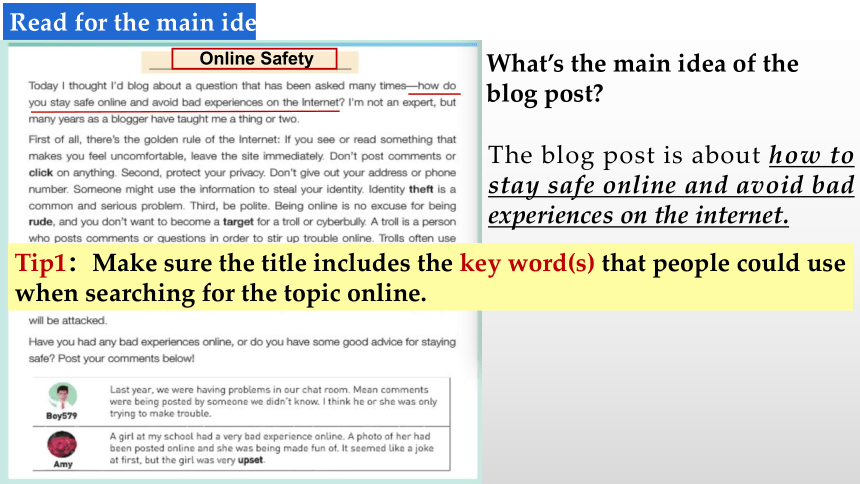
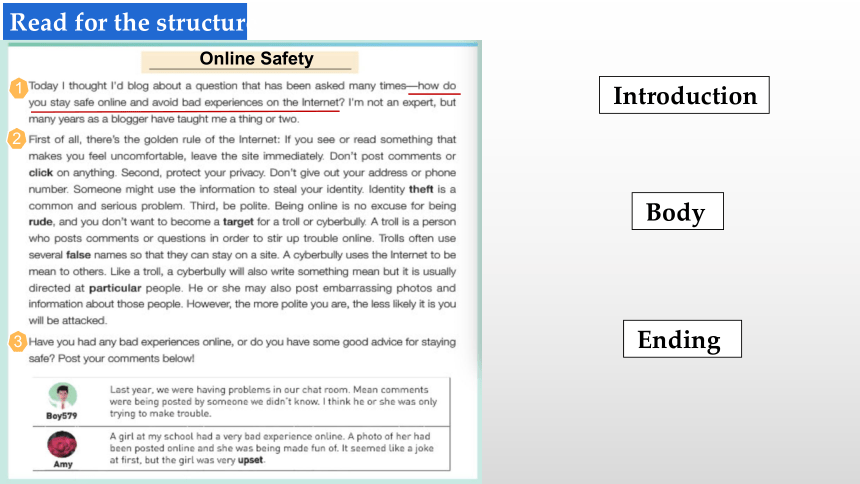
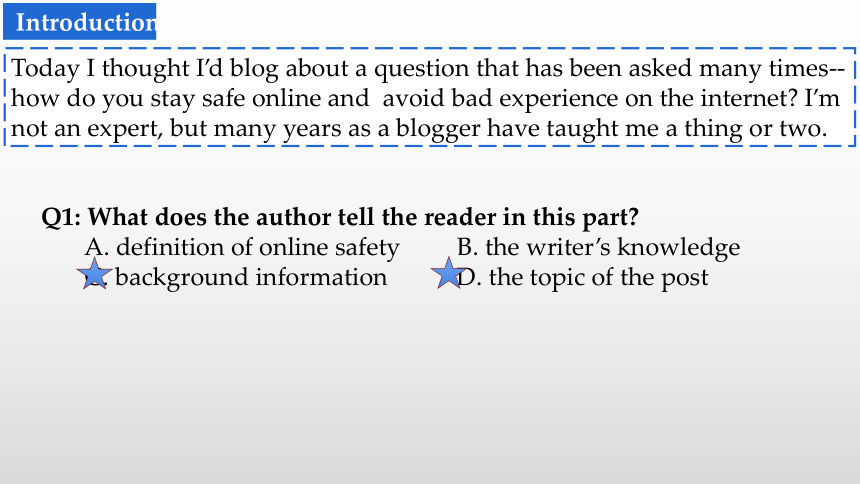
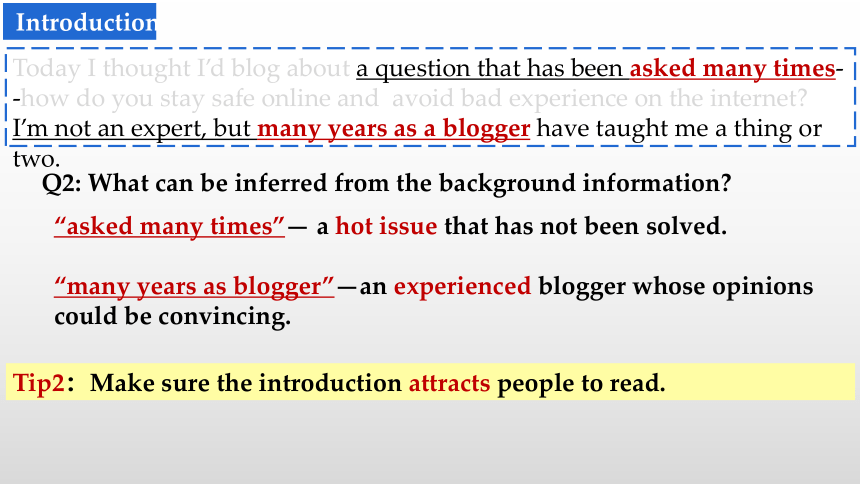
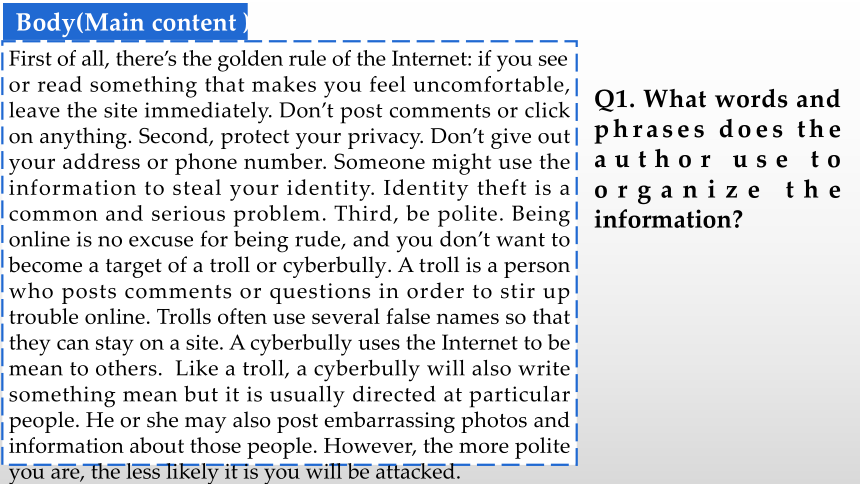
文档简介
(共32张PPT)
人教高中英语·必修第二册
Unit 3 THE INTERNET
Period 6
Reading for Writing
Designed by: Jody
教学内容 & 教学目标
教学内容
本课时学生首先阅读一篇关于安全上网建议的博客文章,然后运用博文中所学的知识,包括博文的文本结构和语言特征,从网上购物,社交媒体和网络聊天室三个话题中挑选一个,学写一篇有关安全上网建议的博客文章。
教学目标
1.通过阅读博文,学生能够掌握安全上网的一些必备技能,避免并应对不愉快的上网经历。
2.运用梳理、归纳等策略,提取文本信息,梳理文本段落间和段落内句子间的关系,整理出文本宏观组织结构,发展逻辑思维能力,并且掌握博文的文本结构和语言特征。
3.依据所学博文的文本结构和语言特征,能够写一篇关于网络安全的博文。
教学过程 & 设计意图
Activity 1: Lead-in
1.Talk about the activities on the Internet.
【设计意图】 通过问题讨论,让学生联系生活实际,互相交换意见,自然引出本堂读写课的话题,即安全上网。
Activity 2: Read the blog post and answer the questions.
Q1:What’s the main idea of the blog post Write a title for it.
Q2:What guidelines does the author provide for online safety
【设计意图】通过回答这两个问题,让学生找出文章中心思想和作者给出的上网建议,并且能培养学生搜索关键词,提炼关键信息的能力。
教学过程 & 设计意图
Activity 3: Read each part of the blog post for structure and the features of language.
Para1. Introduction
Q1:What does the author tell the reader in this part
Q2:What can be inferred from the background information
【设计意图】通过问题帮助学生发现博文的组织结构,如通常在首段会开门见山地介绍文章的主题,并且吸引读者阅读下文。
Para2. Body
Q1: What words and phrases does the author use to organize the information
Q2: What new words are explained in the text
【设计意图】通过问题一引导学生发现first of all,second,third等语篇衔接词的使用。使用衔接手段使语义连贯是写作的重要策略和技巧。通过问题二让学生复习如何给生词下定义。
Para3. Ending
Q1:How does the author end the post
Activity 4: Summary(How to write a good blog post ).
【设计意图】通过总结,能很好的帮助学生梳理博客文章的文体特征,语言特色以及博文写作的一些基本策略,为下一步写作做好准备。
教学过程 & 设计意图
Activity 4: Summary(How to write a good blog post ).
【设计意图】通过总结,能很好的帮助学生梳理博客文章的文体特征,语言特色以及博文写作的一些基本策略,为下一步写作做好准备。
Activity 5: Write a blog post.
1.Choose a topic 2.Write a draft 3.Evaluate the draft using the checklist.
【设计意图】学生先学习教科书所提供的博文,结合所学的内容进行思考总结,然后独立写出初稿,在写作中运用并且内化所学的内容,将知识转化为能力。利用评价清单从内容结构完整性,语言的准确性,建议的具体化等方面进行反馈,给其他同学进行反馈的过程中反思自己,促进知识的进一步内化,形成良好的自我反思能力。
Activity 6: Share a poem about online safety.
【设计意图】通过让学生读一首关于网络安全的诗,加强网络安全意识。
Assignments:
1.Improve your draft, post your blog under your chosen topic and invite your classmates to make comments.
2.Finish exersice 1&2 on page34
【设计意图】作业1通过修改并展示自我,增加学习的动力。
作业2是为下一课时的导入做准备。
Unit3 The InternetReadingfor Writing
Comments
A blog post
What’s the main idea of the blog post
Online Safety
The blog post is about how to stay safe online and avoid bad experiences on the internet.
Read for the main idea
Tip1:Make sure the title includes the key word(s) that people could use when searching for the topic online.
Online Safety
Read for the structure
1
2
3
Introduction
Body
Ending
Today I thought I’d blog about a question that has been asked many times--how do you stay safe online and avoid bad experience on the internet I’m not an expert, but many years as a blogger have taught me a thing or two.
Q1: What does the author tell the reader in this part
A. definition of online safety B. the writer’s knowledge
C. background information D. the topic of the post
Introduction
Q2: What can be inferred from the background information
Today I thought I’d blog about a question that has been asked many times--how do you stay safe online and avoid bad experience on the internet I’m not an expert, but many years as a blogger have taught me a thing or two.
Introduction
Tip2:Make sure the introduction attracts people to read.
“asked many times”— a hot issue that has not been solved.
“many years as blogger”—an experienced blogger whose opinions could be convincing.
Q1. What words and phrases does the author use to organize the information
First of all, there’s the golden rule of the Internet: if you see or read something that makes you feel uncomfortable, leave the site immediately. Don’t post comments or click on anything. Second, protect your privacy. Don’t give out your address or phone number. Someone might use the information to steal your identity. Identity theft is a common and serious problem. Third, be polite. Being online is no excuse for being rude, and you don’t want to become a target of a troll or cyberbully. A troll is a person who posts comments or questions in order to stir up trouble online. Trolls often use several false names so that they can stay on a site. A cyberbully uses the Internet to be mean to others. Like a troll, a cyberbully will also write something mean but it is usually directed at particular people. He or she may also post embarrassing photos and information about those people. However, the more polite you are, the less likely it is you will be attacked.
Body(Main content )
Q1. What words and phrases does the author use to organize the information
First of all, there’s the golden rule of the Internet: if you see or read something that makes you feel uncomfortable, leave the site immediately. Don’t post comments or click on anything. Second, protect your privacy. Don’t give out your address or phone number. Someone might use the information to steal your identity. Identity theft is a common and serious problem. Third, be polite. Being online is no excuse for being rude, and you don’t want to become a target of a troll or cyberbully. A troll is a person who posts comments or questions in order to stir up trouble online. Trolls often use several false names so that they can stay on a site. A cyberbully uses the Internet to be mean to others. Like a troll, a cyberbully will also write something mean but it is usually directed at particular people. He or she may also post embarrassing photos and information about those people. However, the more polite you are, the less likely it is you will be attacked.
Tip3:Present the information in a clear way by using some connective words .
Body(Main content )
Q2. What guidelines does the author provide for online safety
Body(Main content )
First of all, there’s the golden rule of the Internet: if you see or read something that makes you feel uncomfortable, leave the site immediately. Don’t post comments or click on anything. Second, protect your privacy. Don’t give out your address or phone number. Someone might use the information to steal your identity. Identity theft is a common and serious problem. Third, be polite. Being online is no excuse for being rude, and you don’t want to become a target of a troll or cyberbully. A troll is a person who posts comments or questions in order to stir up trouble online. Trolls often use several false names so that they can stay on a site. A cyberbully uses the Internet to be mean to others. Like a troll, a cyberbully will also write something mean but it is usually directed at particular people. He or she may also post embarrassing photos and information about those people. However, the more polite you are, the less likely it is you will be attacked.
Q2. What guidelines does the author provide for online safety
First of all, there’s the golden rule of the Internet: if you see or read something that makes you feel uncomfortable, leave the site immediately. Don’t post comments or click on anything. Second, protect your privacy. Don’t give out your address or phone number. Someone might use the information to steal your identity. Identity theft is a common and serious problem. Third, be polite. Being online is no excuse for being rude, and you don’t want to become a target of a troll or cyberbully. A troll is a person who posts comments or questions in order to stir up trouble online. Trolls often use several false names so that they can stay on a site. A cyberbully uses the Internet to be mean to others. Like a troll, a cyberbully will also write something mean but it is usually directed at particular people. He or she may also post embarrassing photos and information about those people. However, the more polite you are, the less likely it is you will be attacked.
Body(Main content )
First of all, there’s the golden rule of the Internet: if you see or read something that makes you feel uncomfortable, leave the site immediately. Don’t post comments or click on anything. Second, protect your privacy. Don’t give out your address or phone number. Someone might use the information to steal your identity. Identity theft is a common and serious problem. Third, be polite. Being online is no excuse for being rude, and you don’t want to become a target of a troll or cyberbully. A troll is a person who posts comments or questions in order to stir up trouble online. Trolls often use several false names so that they can stay on a site. A cyberbully uses the Internet to be mean to others. Like a troll, a cyberbully will also write something mean but it is usually directed at particular people. He or she may also post embarrassing photos and information about those people. However, the more polite you are, the less likely it is you will be attacked.
Q2. What guidelines does the author provide for online safety
Body(Main content )
First of all, there’s the golden rule of the Internet: if you see or read something that makes you feel uncomfortable, leave the site immediately. Don’t post comments or click on anything. Second, protect your privacy. Don’t give out your address or phone number. Someone might use the information to steal your identity. Identity theft is a common and serious problem. Third, be polite. Being online is no excuse for being rude, and you don’t want to become a target of a troll or cyberbully. A troll is a person who posts comments or questions in order to stir up trouble online. Trolls often use several false names so that they can stay on a site. A cyberbully uses the Internet to be mean to others. Like a troll, a cyberbully will also write something mean but it is usually directed at particular people. He or she may also post embarrassing photos and information about those people. However, the more polite you are, the less likely it is you will be attacked.
Q2. What guidelines does the author provide for online safety
Tip4:Use Dos and Don’ts with reasons to make the guidelines clear and acceptable.
Body(Main content )
reason
First of all, there’s the golden rule of the Internet: if you see or read something that makes you feel uncomfortable, leave the site immediately. Don’t post comments or click on anything. Second, protect your privacy. Don’t give out your address or phone number. Someone might use the information to steal your identity. Identity theft is a common and serious problem. Third, be polite. Being online is no excuse for being rude, and you don’t want to become a target of a troll or cyberbully. A troll is a person who posts comments or questions in order to stir up trouble online. Trolls often use several false names so that they can stay on a site. A cyberbully uses the Internet to be mean to others. Like a troll, a cyberbully will also write something mean but it is usually directed at particular people. He or she may also post embarrassing photos and information about those people. However, the more polite you are, the less likely it is you will be attacked.
Q3. Which one might the author believe the most important
Body(Main content )
First of all, there’s the golden rule of the Internet: if you see or read something that makes you feel uncomfortable, leave the site immediately. Don’t post comments or click on anything. Second, protect your privacy. Don’t give out your address or phone number. Someone might use the information to steal your identity. Identity theft is a common and serious problem. Third, be polite. Being online is no excuse for being rude, and you don’t want to become a target of a troll or cyberbully. A troll is a person who posts comments or questions in order to stir up trouble online. Trolls often use several false names so that they can stay on a site. A cyberbully uses the Internet to be mean to others. Like a troll, a cyberbully will also write something mean but it is usually directed at particular people. He or she may also post embarrassing photos and information about those people. However, the more polite you are, the less likely it is you will be attacked.
Q3. Which one might the author believe the most important
Tip5:Put the most important information in the first place.
Body(Main content )
First of all, there’s the golden rule of the Internet: if you see or read something that makes you feel uncomfortable, leave the site immediately. Don’t post comments or click on anything. Second, protect your privacy. Don’t give out your address or phone number. Someone might use the information to steal your identity. Identity theft is a common and serious problem. Third, be polite. Being online is no excuse for being rude, and you don’t want to become a target of a troll or cyberbully. A troll is a person who posts comments or questions in order to stir up trouble online. Trolls often use several false names so that they can stay on a site. A cyberbully uses the Internet to be mean to others. Like a troll, a cyberbully will also write something mean but it is usually directed at particular people. He or she may also post embarrassing photos and information about those people. However, the more polite you are, the less likely it is you will be attacked.
Q4. What online troublemakers does blog post mention
Body(Main content )
First of all, there’s the golden rule of the Internet: if you see or read something that makes you feel uncomfortable, leave the site immediately. Don’t post comments or click on anything. Second, protect your privacy. Don’t give out your address or phone number. Someone might use the information to steal your identity. Identity theft is a common and serious problem. Third, be polite. Being online is no excuse for being rude, and you don’t want to become a target of a troll or cyberbully. A troll is a person who posts comments or questions in order to stir up trouble online. Trolls often use several false names so that they can stay on a site. A cyberbully uses the Internet to be mean to others. Like a troll, a cyberbully will also write something mean but it is usually directed at particular people. He or she may also post embarrassing photos and information about those people. However, the more polite you are, the less likely it is you will be attacked.
Q4. What online troublemakers does blog post mention
Body(Main content )
First of all, there’s the golden rule of the Internet: if you see or read something that makes you feel uncomfortable, leave the site immediately. Don’t post comments or click on anything. Second, protect your privacy. Don’t give out your address or phone number. Someone might use the information to steal your identity. Identity theft is a common and serious problem. Third, be polite. Being online is no excuse for being rude, and you don’t want to become a target of a troll or cyberbully. A troll is a person who posts comments or questions in order to stir up trouble online. Trolls often use several false names so that they can stay on a site. A cyberbully uses the Internet to be mean to others. Like a troll, a cyberbully will also write something mean but it is usually directed at particular people. He or she may also post embarrassing photos and information about those people. However, the more polite you are, the less likely it is you will be attacked.
Q4. What online troublemakers does blog post mention
Body(Main content )
First of all, there’s the golden rule of the Internet: if you see or read something that makes you feel uncomfortable, leave the site immediately. Don’t post comments or click on anything. Second, protect your privacy. Don’t give out your address or phone number. Someone might use the information to steal your identity. Identity theft is a common and serious problem. Third, be polite. Being online is no excuse for being rude, and you don’t want to become a target of a troll or cyberbully. A troll is a person who posts comments or questions in order to stir up trouble online. Trolls often use several false names so that they can stay on a site. A cyberbully uses the Internet to be mean to others. Like a troll, a cyberbully will also write something mean but it is usually directed at particular people. He or she may also post embarrassing photos and information about those people. However, the more polite you are, the less likely it is you will be attacked.
Q4. How new words are explained
Body(Main content )
First of all, there’s the golden rule of the Internet: if you see or read something that makes you feel uncomfortable, leave the site immediately. Don’t post comments or click on anything. Second, protect your privacy. Don’t give out your address or phone number. Someone might use the information to steal your identity. Identity theft is a common and serious problem. Third, be polite. Being online is no excuse for being rude, and you don’t want to become a target of a troll or cyberbully. A troll is a person who posts comments or questions in order to stir up trouble online. Trolls often use several false names so that they can stay on a site. A cyberbully uses the Internet to be mean to others. Like a troll, a cyberbully will also write something mean but it is usually directed at particular people. He or she may also post embarrassing photos and information about those people. However, the more polite you are, the less likely it is you will be attacked.
Q4. How new words are explained
Body(Main content )
First of all, there’s the golden rule of the Internet: if you see or read something that makes you feel uncomfortable, leave the site immediately. Don’t post comments or click on anything. Second, protect your privacy. Don’t give out your address or phone number. Someone might use the information to steal your identity. Identity theft is a common and serious problem. Third, be polite. Being online is no excuse for being rude, and you don’t want to become a target of a troll or cyberbully. A troll is a person who posts comments or questions in order to stir up trouble online. Trolls often use several false names so that they can stay on a site. A cyberbully uses the Internet to be mean to others. Like a troll, a cyberbully will also write something mean but it is usually directed at particular people. He or she may also post embarrassing photos and information about those people. However, the more polite you are, the less likely it is you will be attacked.
Q4. How new words are explained
Body(Main content )
Tip6:Define new words /terms by giving simplier words
Q: How does the author end the post
By asking for comments.
Have you had any bad experiences online, or do you have some good advice for staying safe Post your comments below!
Tip7:Invite readers to share their thoughts.
Ending
Summary(How to write a good blog post )
Tip1:Make sure the title includes the key word(s) that people could use when
searching for the topic online.
Tip2:Make sure the introduction attracts people to read.
Tip3:Present the information in a clear way by using some connective words .
Tip5:Put the most important information in the first place.
Tip7:Invite readers to share their thoughts.
Tip6:Define the new words /terms by giving simplier words.
Tip4:Use Dos and Don’ts with reasons to make the guidelines clear and acceptable.
Further thinking
Online shopping sites
Social networking apps
Online chat rooms
Use a website you are familiar with.
Use strong passwords.
Don’t use public computers.
...
Don’t post personal information.
Don’t believe everything you read.
Be polite.
…
Don’t give out too much information.
Never meet someone you met online alone.
…
What guidelines can you provide for the following situations
Use what you have learnt to write a blog post.
Writing
Show and Check
Check list(P33)
Does the writer tell the reader what he/she knows about the topic
Are all the tips and suggestions well organised
Has the writer defined the new words
Does the author include examples, comparisons, or explanations
Does the writer end by asking readers to leave comments and suggestions
Can you find any grammar or spelling mistakes
Share Time
A poem about online safety
Cyber Sense
I always keep things secret when I go online.
I never share the things that should be only mine.
My email and my home address, my phone number and name--
These are things only I should know on websites or in games.
And so I use a nonsense name for my net identity.
When folks online ask who I am,I say,“I'm Cyber Me,”
And if I ever think that someone online isn't all that bad,
I never ever meet them without telling Mum or Dad.
1.Improve your draft, post your blog under your chosen topic and invite your classmates to make comments.
2.Finish exercise 1&2 on page34
Online shopping sites
Social networking apps
Online chat rooms
Assignments
Stay safe online!
人教高中英语·必修第二册
Unit 3 THE INTERNET
Period 6
Reading for Writing
Designed by: Jody
教学内容 & 教学目标
教学内容
本课时学生首先阅读一篇关于安全上网建议的博客文章,然后运用博文中所学的知识,包括博文的文本结构和语言特征,从网上购物,社交媒体和网络聊天室三个话题中挑选一个,学写一篇有关安全上网建议的博客文章。
教学目标
1.通过阅读博文,学生能够掌握安全上网的一些必备技能,避免并应对不愉快的上网经历。
2.运用梳理、归纳等策略,提取文本信息,梳理文本段落间和段落内句子间的关系,整理出文本宏观组织结构,发展逻辑思维能力,并且掌握博文的文本结构和语言特征。
3.依据所学博文的文本结构和语言特征,能够写一篇关于网络安全的博文。
教学过程 & 设计意图
Activity 1: Lead-in
1.Talk about the activities on the Internet.
【设计意图】 通过问题讨论,让学生联系生活实际,互相交换意见,自然引出本堂读写课的话题,即安全上网。
Activity 2: Read the blog post and answer the questions.
Q1:What’s the main idea of the blog post Write a title for it.
Q2:What guidelines does the author provide for online safety
【设计意图】通过回答这两个问题,让学生找出文章中心思想和作者给出的上网建议,并且能培养学生搜索关键词,提炼关键信息的能力。
教学过程 & 设计意图
Activity 3: Read each part of the blog post for structure and the features of language.
Para1. Introduction
Q1:What does the author tell the reader in this part
Q2:What can be inferred from the background information
【设计意图】通过问题帮助学生发现博文的组织结构,如通常在首段会开门见山地介绍文章的主题,并且吸引读者阅读下文。
Para2. Body
Q1: What words and phrases does the author use to organize the information
Q2: What new words are explained in the text
【设计意图】通过问题一引导学生发现first of all,second,third等语篇衔接词的使用。使用衔接手段使语义连贯是写作的重要策略和技巧。通过问题二让学生复习如何给生词下定义。
Para3. Ending
Q1:How does the author end the post
Activity 4: Summary(How to write a good blog post ).
【设计意图】通过总结,能很好的帮助学生梳理博客文章的文体特征,语言特色以及博文写作的一些基本策略,为下一步写作做好准备。
教学过程 & 设计意图
Activity 4: Summary(How to write a good blog post ).
【设计意图】通过总结,能很好的帮助学生梳理博客文章的文体特征,语言特色以及博文写作的一些基本策略,为下一步写作做好准备。
Activity 5: Write a blog post.
1.Choose a topic 2.Write a draft 3.Evaluate the draft using the checklist.
【设计意图】学生先学习教科书所提供的博文,结合所学的内容进行思考总结,然后独立写出初稿,在写作中运用并且内化所学的内容,将知识转化为能力。利用评价清单从内容结构完整性,语言的准确性,建议的具体化等方面进行反馈,给其他同学进行反馈的过程中反思自己,促进知识的进一步内化,形成良好的自我反思能力。
Activity 6: Share a poem about online safety.
【设计意图】通过让学生读一首关于网络安全的诗,加强网络安全意识。
Assignments:
1.Improve your draft, post your blog under your chosen topic and invite your classmates to make comments.
2.Finish exersice 1&2 on page34
【设计意图】作业1通过修改并展示自我,增加学习的动力。
作业2是为下一课时的导入做准备。
Unit3 The InternetReadingfor Writing
Comments
A blog post
What’s the main idea of the blog post
Online Safety
The blog post is about how to stay safe online and avoid bad experiences on the internet.
Read for the main idea
Tip1:Make sure the title includes the key word(s) that people could use when searching for the topic online.
Online Safety
Read for the structure
1
2
3
Introduction
Body
Ending
Today I thought I’d blog about a question that has been asked many times--how do you stay safe online and avoid bad experience on the internet I’m not an expert, but many years as a blogger have taught me a thing or two.
Q1: What does the author tell the reader in this part
A. definition of online safety B. the writer’s knowledge
C. background information D. the topic of the post
Introduction
Q2: What can be inferred from the background information
Today I thought I’d blog about a question that has been asked many times--how do you stay safe online and avoid bad experience on the internet I’m not an expert, but many years as a blogger have taught me a thing or two.
Introduction
Tip2:Make sure the introduction attracts people to read.
“asked many times”— a hot issue that has not been solved.
“many years as blogger”—an experienced blogger whose opinions could be convincing.
Q1. What words and phrases does the author use to organize the information
First of all, there’s the golden rule of the Internet: if you see or read something that makes you feel uncomfortable, leave the site immediately. Don’t post comments or click on anything. Second, protect your privacy. Don’t give out your address or phone number. Someone might use the information to steal your identity. Identity theft is a common and serious problem. Third, be polite. Being online is no excuse for being rude, and you don’t want to become a target of a troll or cyberbully. A troll is a person who posts comments or questions in order to stir up trouble online. Trolls often use several false names so that they can stay on a site. A cyberbully uses the Internet to be mean to others. Like a troll, a cyberbully will also write something mean but it is usually directed at particular people. He or she may also post embarrassing photos and information about those people. However, the more polite you are, the less likely it is you will be attacked.
Body(Main content )
Q1. What words and phrases does the author use to organize the information
First of all, there’s the golden rule of the Internet: if you see or read something that makes you feel uncomfortable, leave the site immediately. Don’t post comments or click on anything. Second, protect your privacy. Don’t give out your address or phone number. Someone might use the information to steal your identity. Identity theft is a common and serious problem. Third, be polite. Being online is no excuse for being rude, and you don’t want to become a target of a troll or cyberbully. A troll is a person who posts comments or questions in order to stir up trouble online. Trolls often use several false names so that they can stay on a site. A cyberbully uses the Internet to be mean to others. Like a troll, a cyberbully will also write something mean but it is usually directed at particular people. He or she may also post embarrassing photos and information about those people. However, the more polite you are, the less likely it is you will be attacked.
Tip3:Present the information in a clear way by using some connective words .
Body(Main content )
Q2. What guidelines does the author provide for online safety
Body(Main content )
First of all, there’s the golden rule of the Internet: if you see or read something that makes you feel uncomfortable, leave the site immediately. Don’t post comments or click on anything. Second, protect your privacy. Don’t give out your address or phone number. Someone might use the information to steal your identity. Identity theft is a common and serious problem. Third, be polite. Being online is no excuse for being rude, and you don’t want to become a target of a troll or cyberbully. A troll is a person who posts comments or questions in order to stir up trouble online. Trolls often use several false names so that they can stay on a site. A cyberbully uses the Internet to be mean to others. Like a troll, a cyberbully will also write something mean but it is usually directed at particular people. He or she may also post embarrassing photos and information about those people. However, the more polite you are, the less likely it is you will be attacked.
Q2. What guidelines does the author provide for online safety
First of all, there’s the golden rule of the Internet: if you see or read something that makes you feel uncomfortable, leave the site immediately. Don’t post comments or click on anything. Second, protect your privacy. Don’t give out your address or phone number. Someone might use the information to steal your identity. Identity theft is a common and serious problem. Third, be polite. Being online is no excuse for being rude, and you don’t want to become a target of a troll or cyberbully. A troll is a person who posts comments or questions in order to stir up trouble online. Trolls often use several false names so that they can stay on a site. A cyberbully uses the Internet to be mean to others. Like a troll, a cyberbully will also write something mean but it is usually directed at particular people. He or she may also post embarrassing photos and information about those people. However, the more polite you are, the less likely it is you will be attacked.
Body(Main content )
First of all, there’s the golden rule of the Internet: if you see or read something that makes you feel uncomfortable, leave the site immediately. Don’t post comments or click on anything. Second, protect your privacy. Don’t give out your address or phone number. Someone might use the information to steal your identity. Identity theft is a common and serious problem. Third, be polite. Being online is no excuse for being rude, and you don’t want to become a target of a troll or cyberbully. A troll is a person who posts comments or questions in order to stir up trouble online. Trolls often use several false names so that they can stay on a site. A cyberbully uses the Internet to be mean to others. Like a troll, a cyberbully will also write something mean but it is usually directed at particular people. He or she may also post embarrassing photos and information about those people. However, the more polite you are, the less likely it is you will be attacked.
Q2. What guidelines does the author provide for online safety
Body(Main content )
First of all, there’s the golden rule of the Internet: if you see or read something that makes you feel uncomfortable, leave the site immediately. Don’t post comments or click on anything. Second, protect your privacy. Don’t give out your address or phone number. Someone might use the information to steal your identity. Identity theft is a common and serious problem. Third, be polite. Being online is no excuse for being rude, and you don’t want to become a target of a troll or cyberbully. A troll is a person who posts comments or questions in order to stir up trouble online. Trolls often use several false names so that they can stay on a site. A cyberbully uses the Internet to be mean to others. Like a troll, a cyberbully will also write something mean but it is usually directed at particular people. He or she may also post embarrassing photos and information about those people. However, the more polite you are, the less likely it is you will be attacked.
Q2. What guidelines does the author provide for online safety
Tip4:Use Dos and Don’ts with reasons to make the guidelines clear and acceptable.
Body(Main content )
reason
First of all, there’s the golden rule of the Internet: if you see or read something that makes you feel uncomfortable, leave the site immediately. Don’t post comments or click on anything. Second, protect your privacy. Don’t give out your address or phone number. Someone might use the information to steal your identity. Identity theft is a common and serious problem. Third, be polite. Being online is no excuse for being rude, and you don’t want to become a target of a troll or cyberbully. A troll is a person who posts comments or questions in order to stir up trouble online. Trolls often use several false names so that they can stay on a site. A cyberbully uses the Internet to be mean to others. Like a troll, a cyberbully will also write something mean but it is usually directed at particular people. He or she may also post embarrassing photos and information about those people. However, the more polite you are, the less likely it is you will be attacked.
Q3. Which one might the author believe the most important
Body(Main content )
First of all, there’s the golden rule of the Internet: if you see or read something that makes you feel uncomfortable, leave the site immediately. Don’t post comments or click on anything. Second, protect your privacy. Don’t give out your address or phone number. Someone might use the information to steal your identity. Identity theft is a common and serious problem. Third, be polite. Being online is no excuse for being rude, and you don’t want to become a target of a troll or cyberbully. A troll is a person who posts comments or questions in order to stir up trouble online. Trolls often use several false names so that they can stay on a site. A cyberbully uses the Internet to be mean to others. Like a troll, a cyberbully will also write something mean but it is usually directed at particular people. He or she may also post embarrassing photos and information about those people. However, the more polite you are, the less likely it is you will be attacked.
Q3. Which one might the author believe the most important
Tip5:Put the most important information in the first place.
Body(Main content )
First of all, there’s the golden rule of the Internet: if you see or read something that makes you feel uncomfortable, leave the site immediately. Don’t post comments or click on anything. Second, protect your privacy. Don’t give out your address or phone number. Someone might use the information to steal your identity. Identity theft is a common and serious problem. Third, be polite. Being online is no excuse for being rude, and you don’t want to become a target of a troll or cyberbully. A troll is a person who posts comments or questions in order to stir up trouble online. Trolls often use several false names so that they can stay on a site. A cyberbully uses the Internet to be mean to others. Like a troll, a cyberbully will also write something mean but it is usually directed at particular people. He or she may also post embarrassing photos and information about those people. However, the more polite you are, the less likely it is you will be attacked.
Q4. What online troublemakers does blog post mention
Body(Main content )
First of all, there’s the golden rule of the Internet: if you see or read something that makes you feel uncomfortable, leave the site immediately. Don’t post comments or click on anything. Second, protect your privacy. Don’t give out your address or phone number. Someone might use the information to steal your identity. Identity theft is a common and serious problem. Third, be polite. Being online is no excuse for being rude, and you don’t want to become a target of a troll or cyberbully. A troll is a person who posts comments or questions in order to stir up trouble online. Trolls often use several false names so that they can stay on a site. A cyberbully uses the Internet to be mean to others. Like a troll, a cyberbully will also write something mean but it is usually directed at particular people. He or she may also post embarrassing photos and information about those people. However, the more polite you are, the less likely it is you will be attacked.
Q4. What online troublemakers does blog post mention
Body(Main content )
First of all, there’s the golden rule of the Internet: if you see or read something that makes you feel uncomfortable, leave the site immediately. Don’t post comments or click on anything. Second, protect your privacy. Don’t give out your address or phone number. Someone might use the information to steal your identity. Identity theft is a common and serious problem. Third, be polite. Being online is no excuse for being rude, and you don’t want to become a target of a troll or cyberbully. A troll is a person who posts comments or questions in order to stir up trouble online. Trolls often use several false names so that they can stay on a site. A cyberbully uses the Internet to be mean to others. Like a troll, a cyberbully will also write something mean but it is usually directed at particular people. He or she may also post embarrassing photos and information about those people. However, the more polite you are, the less likely it is you will be attacked.
Q4. What online troublemakers does blog post mention
Body(Main content )
First of all, there’s the golden rule of the Internet: if you see or read something that makes you feel uncomfortable, leave the site immediately. Don’t post comments or click on anything. Second, protect your privacy. Don’t give out your address or phone number. Someone might use the information to steal your identity. Identity theft is a common and serious problem. Third, be polite. Being online is no excuse for being rude, and you don’t want to become a target of a troll or cyberbully. A troll is a person who posts comments or questions in order to stir up trouble online. Trolls often use several false names so that they can stay on a site. A cyberbully uses the Internet to be mean to others. Like a troll, a cyberbully will also write something mean but it is usually directed at particular people. He or she may also post embarrassing photos and information about those people. However, the more polite you are, the less likely it is you will be attacked.
Q4. How new words are explained
Body(Main content )
First of all, there’s the golden rule of the Internet: if you see or read something that makes you feel uncomfortable, leave the site immediately. Don’t post comments or click on anything. Second, protect your privacy. Don’t give out your address or phone number. Someone might use the information to steal your identity. Identity theft is a common and serious problem. Third, be polite. Being online is no excuse for being rude, and you don’t want to become a target of a troll or cyberbully. A troll is a person who posts comments or questions in order to stir up trouble online. Trolls often use several false names so that they can stay on a site. A cyberbully uses the Internet to be mean to others. Like a troll, a cyberbully will also write something mean but it is usually directed at particular people. He or she may also post embarrassing photos and information about those people. However, the more polite you are, the less likely it is you will be attacked.
Q4. How new words are explained
Body(Main content )
First of all, there’s the golden rule of the Internet: if you see or read something that makes you feel uncomfortable, leave the site immediately. Don’t post comments or click on anything. Second, protect your privacy. Don’t give out your address or phone number. Someone might use the information to steal your identity. Identity theft is a common and serious problem. Third, be polite. Being online is no excuse for being rude, and you don’t want to become a target of a troll or cyberbully. A troll is a person who posts comments or questions in order to stir up trouble online. Trolls often use several false names so that they can stay on a site. A cyberbully uses the Internet to be mean to others. Like a troll, a cyberbully will also write something mean but it is usually directed at particular people. He or she may also post embarrassing photos and information about those people. However, the more polite you are, the less likely it is you will be attacked.
Q4. How new words are explained
Body(Main content )
Tip6:Define new words /terms by giving simplier words
Q: How does the author end the post
By asking for comments.
Have you had any bad experiences online, or do you have some good advice for staying safe Post your comments below!
Tip7:Invite readers to share their thoughts.
Ending
Summary(How to write a good blog post )
Tip1:Make sure the title includes the key word(s) that people could use when
searching for the topic online.
Tip2:Make sure the introduction attracts people to read.
Tip3:Present the information in a clear way by using some connective words .
Tip5:Put the most important information in the first place.
Tip7:Invite readers to share their thoughts.
Tip6:Define the new words /terms by giving simplier words.
Tip4:Use Dos and Don’ts with reasons to make the guidelines clear and acceptable.
Further thinking
Online shopping sites
Social networking apps
Online chat rooms
Use a website you are familiar with.
Use strong passwords.
Don’t use public computers.
...
Don’t post personal information.
Don’t believe everything you read.
Be polite.
…
Don’t give out too much information.
Never meet someone you met online alone.
…
What guidelines can you provide for the following situations
Use what you have learnt to write a blog post.
Writing
Show and Check
Check list(P33)
Does the writer tell the reader what he/she knows about the topic
Are all the tips and suggestions well organised
Has the writer defined the new words
Does the author include examples, comparisons, or explanations
Does the writer end by asking readers to leave comments and suggestions
Can you find any grammar or spelling mistakes
Share Time
A poem about online safety
Cyber Sense
I always keep things secret when I go online.
I never share the things that should be only mine.
My email and my home address, my phone number and name--
These are things only I should know on websites or in games.
And so I use a nonsense name for my net identity.
When folks online ask who I am,I say,“I'm Cyber Me,”
And if I ever think that someone online isn't all that bad,
I never ever meet them without telling Mum or Dad.
1.Improve your draft, post your blog under your chosen topic and invite your classmates to make comments.
2.Finish exercise 1&2 on page34
Online shopping sites
Social networking apps
Online chat rooms
Assignments
Stay safe online!
